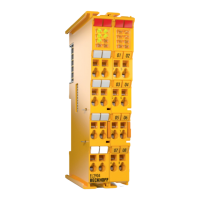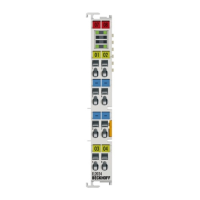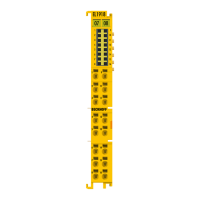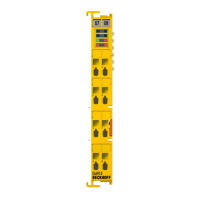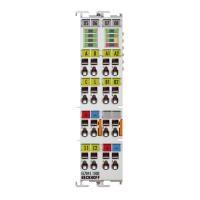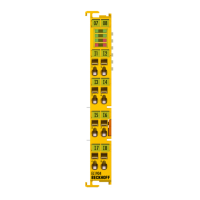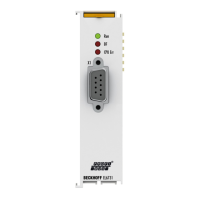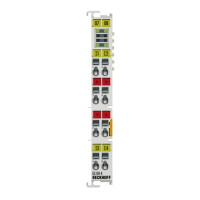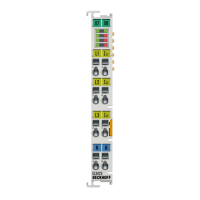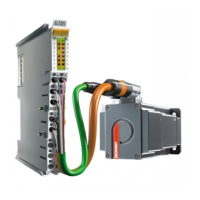Do you have a question about the Beckhoff EL28 Series and is the answer not in the manual?
Overview of EtherCAT digital HD output terminals, their types, and specifications.
Guidance for users regarding the documentation's intended audience, disclaimers, and trademarks.
Details changes and updates made to document versions.
Explains the 14-digit designation system for Beckhoff EtherCAT devices.
Defines non-reactive terminals and lists terminals with their hardware versions.
Introduction to the EL2808 EtherCAT terminal, its features, and basic specifications.
Introduction to the EL2828 EtherCAT terminal, its features, and basic specifications.
Introduction to EL2809 and EL2889 EtherCAT terminals, their features, and specifications.
Introduction to EL2872 and EL2872-0010 EtherCAT terminals, features, and specifications.
Introduction to the EL2819 EtherCAT terminal with diagnostics, its features, and specifications.
Explains terminal overload protection mechanisms, current limitation, and thermal switch-off.
Discusses operating modes, parameterization, and process data for the EL2819 terminal.
Details channel-specific diagnostics like Open Load, Short Circuit, and Overtemperature.
Describes device-level diagnostics such as General Error, Overtemperature, Undervoltage, and Voltage Loss.
Explains how to configure terminal settings using the CoE directory in TwinCAT.
Introduces EtherCAT XML Device Description and parameterization methods.
Describes restoring default parameters and backup objects to the terminal's delivery state.
Details safe state active and safe state value configurations for channels.
Explains command objects for DIG command and related status/response information.
Lists input data objects for diagnostics like Overtemperature, Open Load, Overcurrent, and Short Circuit.
Defines output data objects for DIG Outputs, including status and output states.
Covers standard objects like Device Type and Device Name.
Refers to the EtherCAT System Documentation for fieldbus basics.
Details EtherCAT cabling requirements, cable length, connectors, and recommended cables.
Explains SM and PDI watchdog settings for terminal output safety and communication monitoring.
Describes the EtherCAT State Machine (ESM) states and their control flow.
Explains the CANopen over EtherCAT (CoE) interface for parameter management.
Details the characteristics and synchronization of distributed clocks in EtherCAT slaves.
Provides instructions for preventing electrostatic discharge damage to devices during handling.
Covers safe installation procedures for mounting terminals on DIN rails.
Details additional installation steps for terminals requiring enhanced mechanical load capacity.
Introduces connection options for the Bus Terminal system.
Explains different connection options like standard and pluggable wiring.
Describes how to connect solid or finely stranded cables to terminal points using spring force technology.
Advises on connecting shielded, twisted-paired wires for sensors and actuators.
Discusses constraints and recommendations for terminal installation positions and ventilation.
Guides on correct positioning of passive terminals in the bus terminal block for optimal data transfer.
Provides UL application and examination notices for Beckhoff EtherCAT modules.
Outlines special conditions for using components in potentially explosive areas at standard temperatures.
Outlines special conditions for using components in potentially explosive areas with extended temperature ranges.
Directs users to additional documentation for ATEX terminal systems.
Introduces TwinCAT as a development environment for real-time control and configuration.
Details the startup process and user interfaces for TwinCAT 2 System Manager.
Describes the startup process and user interface for TwinCAT 3, integrating with Visual Studio.
Explains the TwinCAT Development Environment, its versions, and features.
Guides on installing the Beckhoff real-time driver for IPC controllers.
Explains the importance and installation of ESI (EtherCAT Slave Information) files.
Describes how to use the TwinCAT ESI Updater for managing device descriptions.
Differentiates between online (scanning existing hardware) and offline (manual configuration) methods.
Details the process of creating an EtherCAT device configuration offline.
Explains how to detect and scan EtherCAT devices for online configuration.
Guides on configuring EtherCAT subscribers (terminals) within TwinCAT.
Provides general notes on EtherCAT slave operation, diagnosis, and status within TwinCAT.
Refers to EtherCAT system documentation for AL status codes.
Details firmware compatibility between hardware and firmware versions for Beckhoff EtherCAT devices.
Describes the process for updating firmware on Beckhoff EtherCAT slaves.
Explains the importance and update process for ESI device descriptions.
Explains how to determine firmware versions via laser inscription and System Manager.
Guides on updating controller firmware files (*.efw) for EtherCAT slaves.
Describes how to update FPGA firmware files (*.rbf) for EtherCAT communication.
Explains how to update firmware and ESI for multiple devices simultaneously.
Notes that passive terminals have no firmware to update.
Details how to restore terminal delivery state using CoE object Restore default parameters.
Provides contact information for Beckhoff support, branch offices, and service.
| Relative humidity | 95 %, no condensation |
|---|---|
| Protection class | IP20 |
| Electrical isolation | 500 V |
| Storage temperature | 85 °C |
| Number of channels | 8 |
